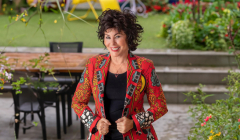
‘Being frazzled in the workplace has been dangerously normalised’
Comedian and actress Ruby Wax, Founder of mental health charity Frazzled, on taking stress seriously.
Far away from the bright lights and empty stadiums of the Premier League, a campaign for World Refugee Day powerfully represented the real strength of the beautiful game.

After 100 days away, last week marked the return of the Premier League season behind closed doors. A tentative step towards normality which underlined the cultural firepower of football, as 20 clubs, hundreds of players and millions of fans returned to the game they love and proved that absence does indeed make the heart grow fonder. Yet far away from the bright lights and empty stadiums of the Premier League, a campaign for World Refugee Day powerfully represented the real strength of the beautiful game.
Goal Click and UNHCR, the UN Refugee Agency launched a photographic storytelling series, collaborating with refugees and asylum seekers across the globe to document their personal stories through football.
The ‘Goal Click Refugees’ series ran across five continents, using a disposable analogue camera which was given to participants to empower them to capture what football means to them, in their own words and through their own lens.
The results are an intimate series of stories and photographs which reflect the lived reality of each individual. The unifying experience and love for football meanwhile, provides the sporting antidote for a media ecosystem which all too often looks for ways to ‘other’ refugees and rob them of their humanity.
Now, more than ever, the voices of the marginalised need to be heard.
Matthew Barrett, Founder, Goal Click
The intimate and unfiltered stories from camps in Jordan, Kenya and South Sudan have created a platform for untold stories. With photos and texts coming from 28 refugee storytellers, the common language of football ties each story together.
As Mahmoud, a refugee from Syria, explains: “I started to love sports when I was a child in Daraa, Syria, and now a day of sports helps me to heal from the depression and sadness in the camp. I played football in Syria with my school team but left because of the war. I enjoy playing football and it gives me hope.”
The UNHCR promotes sports participation as a vital way of improving self-worth and confidence. This can help people recover from past traumas and also find the self-confidence to begin an apprenticeship or start a new job.
Matthew Barrett, the Founder of Goal Click, added that the series aims to challenge existing stereotypes and give an intimate look into refugees’ football lives, in a way that no one from outside these communities could do. He added: “Now, more than ever, the voices of the marginalised need to be heard.”
One of those voices is Shegofa Hassani, 21, a refugee from Afghanistan, who is now a football coach. Her passion for football started as a child when she played with her brothers. However, she hesitated to pursue it further because of cultural barriers and her family.
This campaign has given her a platform to share her message with other girls. She explains: ‘I want more and more Afghan girls to dream big…We fled Afghanistan because of the conflict. I started playing football in the park with my brothers and dad. As my brothers started to play with a club, naturally I wanted to follow but initially my mum was reluctant because of our culture and what people would say. I feel like my truest self when I am on the football pitch. It is where I feel most empowered and most connected with people around me.”
Goal Click Refugees will be a year-long campaign, building towards a physical exhibition during the UEFA European Football Championship in 2021. The full series can be viewed as an online exhibition on the UNHCR website.


Looks like you need to create a Creativebrief account to perform this action.
Create account Sign inLooks like you need to create a Creativebrief account to perform this action.
Create account Sign in